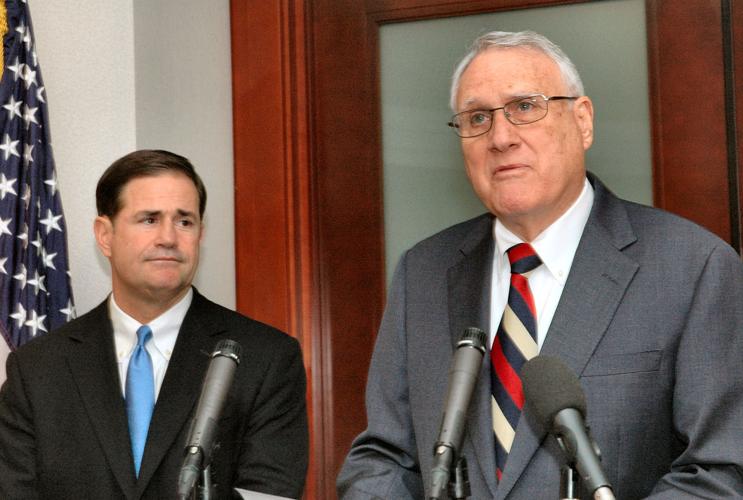By the time Doug Ducey appointed Jon Kyl to replace Sen. John McCain on Tuesday, it seemed like the sensible, honorable thing to do.
Kyl is experienced, respected and conservative, but not personally allied with President Trump. He served 18 years in the Senate and could be more than a placeholder for Arizona residents while filling out the two years until an election must be held, in November 2020. Kyl also had a good relationship with McCain and was approved by his widow, Cindy.
But then, in a news conference with Ducey, Kyl mentioned his short commitment to the job — about four months. And suddenly, the underlying political math became clearer and the choice looked more starkly partisan than the commonsense one it first appeared. The elder statesman Kyl, 76, appeared calculating.
Follow my logic and you’ll get what I mean.
After Kyl left office in 2013, he began working as a lobbyist. For him, this was the completion of a 360-degree professional turn, because he had begun his career as a lobbyist, then moved on to the U.S. House before being elected to the Senate in 1994. His return to lobbying completed the circle. And now he’s going around the professional circle again, making a 540-degree turn by returning to the Senate, if only for a short time.
Kyl is going back to the upper chamber of Congress just in time to cast a potentially deciding vote for a man who was, functionally, his most important recent lobbying client, Brett Kavanaugh. Since July, Kyl has been working as a “sherpa” — that’s the term they use in D.C. — shepherding Kavanaugh through the treacherous process of Senate confirmation to the U.S. Supreme Court. I have not been able to determine whether Kyl has been paid for this, or if this was legally considered lobbying, but practically speaking it is.
I called the Center for Responsive Politics to ask how acting as a sherpa compares to traditional lobbying activities. Dan Auble, who is a senior researcher at the center who manages its lobbying database, told me that hinges largely on whether Kyl is making money for shepherding Kavanaugh.
“If you are being paid and spending your time on contacting government officials, then you should be considered a lobbyist.”
So, now that Kyl has brought Kavanaugh to many senators’ offices, prepared Kavanaugh for rough questioning, and gotten him all the way to his confirmation hearing, which started Tuesday, Kyl is switching roles and being given a vote. It’s a switch most lobbyists could only dream of.
It’s as if he were returning just in time to cast a vote in favor of including copper on the draft list of critical minerals — something that Kyl lobbied for on behalf of Freeport McMoran, one of the clients of Kyl’s firm, Covington & Burling. Freeport paid $20,000 for that help in the first quarter this year.
Or it’s as if he were returning to the Senate just in time to vote the way Qualcomm wants on vehicle-to-vehicle communications issues. Qualcomm has paid $2.2 million to Covington & Burling this year, and the company used 17 of the firm’s lobbyists, including Kyl, to promote Qualcomm’s interests.
But of course, the stakes are much higher with the Kavanaugh nomination, because it’s a permanent seat on the U.S. Supreme Court that Kyl will be voting on, not just the status of copper among its fellow minerals.
This is only one of two troubling aspects of Kyl’s short commitment to the Senate job. The other involves this November’s general election. U.S. Rep. Martha McSally, a Tucson Republican, is in a tough race for U.S. Senate against Rep. Kyrsten Sinema of Phoenix. They’re both strong candidates — either could conceivably lose.
If McSally loses, Kyl could honor his commitment to complete this congressional session and quit in time for Ducey to appoint McSally to the seat. That could work even if Ducey loses his bid for re-election to challenger David Garcia, although there would have to be a quick resignation and appointment probably in late December.
Any governor, Garcia or Ducey, would have to appoint a Republican. But it’s likely Garcia would appoint the most moderate, anti-Trump Republican possible, while McSally has hewed increasingly close to a pro-Trump line.
And if all of this plays out — if Kyl casts a vote that puts Kavanaugh on the Supreme Court, and if McSally loses but then is appointed after Kyl quits — Kyl can return to lobbying again, completing his second 360-degree circle between lobbying and elected office.
The man is respected, intelligent and knows Arizona issues. Better yet for Ducey, Kyl is acceptable to the main GOP factions.
But Kyl’s intimate, lobbyist-style link to Kavanaugh, and his limited commitment to the job, takes the luster off the appointment and makes it look more like a brazenly political play.





